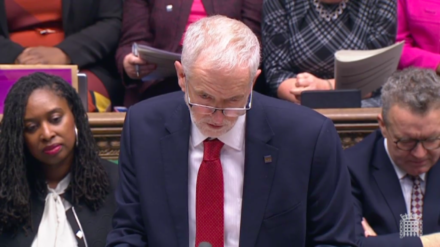
Theresa May has been leading the way on a two-pronged government strategy to sell her Brexit deal. Remainers are told: vote down the deal, and you’ll risk no-deal. Brexiteers are told: vote down the deal, and you’ll risk no Brexit. There’s an obvious problem with this communications game plan, though, which is basically that we can all clearly witness it. Campaigners at both ends of the Brexit spectrum may be single-minded, but they still have eyes and ears. Unfortunately for the Prime Minister, it seems that the two groups have been listening to each others’ warnings instead of their own – and as quite a number of Brexiteer MPs are happy to risk no-deal, while some even favour it, and Remainers are overjoyed by the admission that Brexit can be stopped altogether, that isn’t helpful for the government at all.
This is the flaw exploited by Jeremy Corbyn at Prime Minister’s Questions today. Picking up on Amber Rudd’s stated view that “the House of Commons will stop ‘no deal’”, the Labour leader kicked off the session by asking: “Does the Prime Minister agree there are no circumstances under which Britain would leave with no deal?” May replies, “No”, but went on to agree that voting down her deal would “risk no Brexit at all”. While the Tory benches remain remarkably quiet, Corbyn pressed the PM on whether this deal is her final attempt, and points out that Steve Barclay – he’s the new Brexit Secretary – will not be accompanying her to Brussels later today. It seems “the post is now an entirely ceremonial one,” he quips.
The careful trajectory Corbyn is having to skillfully manoeuvre at PMQs in the run-up to the Commons vote on the withdrawal agreement and political declaration is to pick holes in the deal, keeping Labour MPs onside, while pouring salt in the wounds of Tory Brexiteers, which can come across as agreeing with their criticisms. He must do this all without taking leave from an identifiable and more or less consistent party line on Brexit. So far, his strategy – unlike May’s – seems to be working. It now looks like only a couple of Labour MPs are considering voting in favour of the deal, though even they seem unlikely to rebel now, and Tory MPs simply aren’t backing their leader. Backbencher after backbencher sitting behind Theresa May stood up and spoke against her deal, both before and after Corbyn questioned the PM. If May is genuinely hoping to get her deal passed on the first go, she better think of an alternative strategy – and fast.




More from LabourList
Government abandons plans to delay 30 local elections in England
‘The cost of living crisis is still Britain’s defining political challenge’
‘Nurses are finally getting the recognition they deserve’